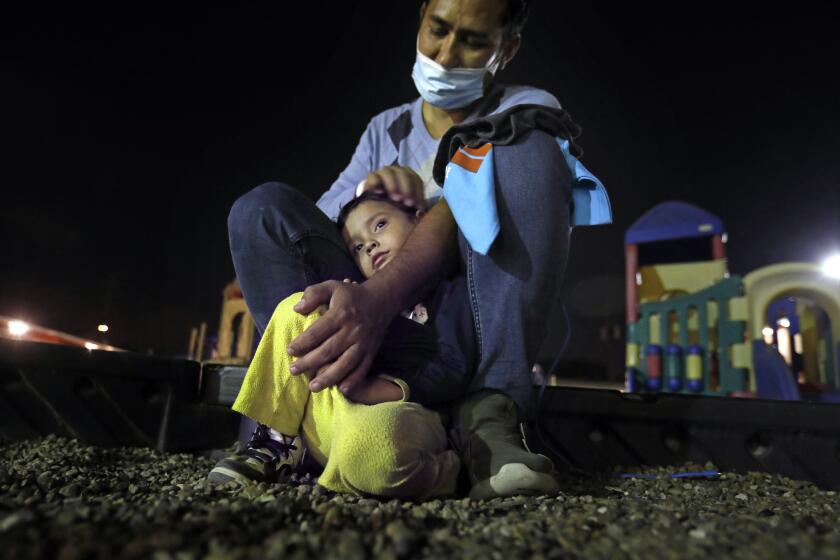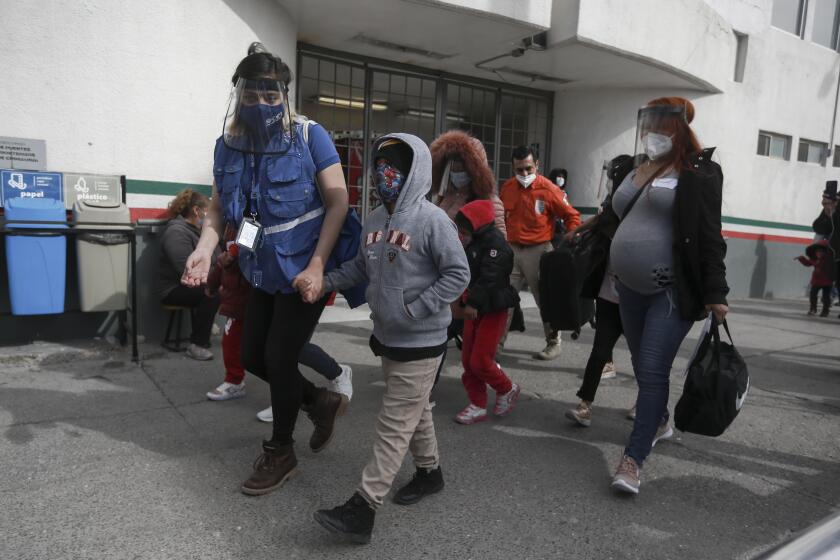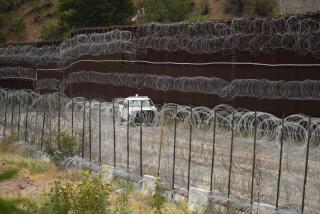House passes ‘Dreamers’ bill as immigration debate intensifies — at the border and in Congress

With dueling images and opposing narratives, Republicans and Democrats have reopened the debate over immigration, posing risks for Biden.
- Share via
WASHINGTON — The long-raging debate over fixing the nation’s dysfunctional immigration system flared back to life this week, with Republicans seeking political advantage from a surge of children at the southwestern border as Democrats pressed forward with legislation that could create a path to citizenship for millions, including young “Dreamers.”
Although both sides agree that the current immigration system works poorly, efforts at reform have stalled for two decades.
The voters for whom the issue is a top priority tend to be strongly partisan, giving elected officials little political incentive to appeal to the other side. Although polls have shown that the country as a whole grew more liberal on immigration issues during the Trump administration, Republicans have moved toward increasingly hard-line positions, undercutting possibilities for legislative compromise.
For the Biden administration, the increased number of young migrants at the border — now running at several hundred arriving each day — carries risk. Officials have tried to undo Trump administration policies that many saw as inhumane without sparking a huge new influx of migrants that could re-create the chaos of previous border surges in 2014, under President Obama, and in 2019, under President Trump. A widespread perception of the border being out of control could damage President Biden in voters’ eyes.
The president and other administration officials have stressed that the border remains closed and that the vast majority of adult migrants are quickly expelled. They have urged Central Americans to stay home.
“I can say quite clearly: Don’t come over,” Biden said in an interview Tuesday with ABC’s George Stephanopoulos.
Officials acknowledge, however, that smuggling cartels have highlighted the change in U.S. administrations to encourage migrants.
“The president’s message will get widely distributed,” said Roberta Jacobson, White House coordinator for border issues, in an interview Wednesday with NBC. But, she added, “as I have said before, the smugglers are very agile, and their message gets through quickly.”
Churches and volunteers are coordinating the response in Texas’ Rio Grande Valley, epicenter of an influx of migrants and unaccompanied children.
Republicans face their own risks, however. The party made notable gains among Latino voters in 2020, but could lose ground by renewing an image of being hostile to immigrants.
As each side seeks to rally supporters and shape public opinion, the parties have pressed dueling narratives, both involving young migrants.
Republicans have portrayed teenage migrants at the border as a threat, and at a House hearing Wednesday, GOP lawmakers repeatedly raised the specter of migrants infected with the coronavirus coming into the country.
Legislation for ‘Dreamers’ and farmworkers
Democrats have pointed to so-called Dreamers — young people who were brought to this country as children and have lived most of their lives here without legal status — as exemplars of America’s promise.
In House debate Thursday, Speaker Nancy Pelosi (D-San Francisco) lauded Dreamers as teachers, doctors, entrepreneurs and first responders.
“They contribute to our community in every way,” Pelosi said. “They’re an integral thread in the fabric of our nation.”
The House, voting 228 to 197 on Thursday, approved the bill to provide a path to citizenship for Dreamers.
Many of the young migrants have lived and worked in the United States legally since 2012 under Deferred Action for Childhood Arrivals, an order by Obama. Trump sought to revoke the order, widely known as DACA, but was blocked last year by the Supreme Court.
Nine Republicans joined all House Democrats in voting yes on the Dreamers bill Thursday.
The bill would also provide permanent residence to immigrants currently in the U.S. on temporary protected status. The legislation, if it becomes law, could quickly provide green cards and a path to citizenship for close to 3 million immigrants in all, according to the Migration Policy Institute, a Washington think tank.
The House also approved a second measure that would significantly expand the number of seasonal farmworkers allowed to enter the U.S. and work. That bill passed 247 to 174, with 30 Republicans joining and all but one Democrat in favor.
Those votes represent the opening shot in a legislative battle likely to stretch deep into the year. Although the Dreamers’ cause has enjoyed strong public support, and the farmworkers measure has backing from a significant number of Republicans from agricultural districts, both face solid opposition from hard-line immigration opponents in the Senate. Republican leaders have denounced the Dreamers measure as “amnesty” — a label that has repeatedly sunk previous immigration bills.
Waiting on comprehensive reform
A comprehensive immigration reform measure proposed by the Biden administration, which could offer legal status to some 11 million immigrants and change the overall structure of U.S. immigration practices, could come to the House floor this spring, but faces an even more difficult path in the Senate.
The bill’s supporters had hoped to consider it as soon as this week but put off action as even many Democrats weren’t ready to vote. Many in both parties say that trying to deal with the immigration system’s problems one bite at a time may be more effective.
“You have to do it in pieces. People call it piecemeal; I think it makes all the sense in the world,” said Republican Sen. Marco Rubio of Florida, who initially backed an unsuccessful bipartisan effort at comprehensive reform during the Obama administration. “We do that on issues all the time.”
Even Republicans who supported past immigration compromises say any new legislation needs to be accompanied by measures aimed at tightening security.
In January and February, border authorities encountered more than 15,000 unaccompanied minors. Is this a significant rise? Here are the facts.
“You’ve got to marry it up with some border security provisions,” said Sen. Lindsey Graham of South Carolina, another Republican who backed the comprehensive reform bill in 2013. Otherwise, he warned, giving more people legal status will “continue to incentivize the flow” of unauthorized immigration.
Talk of border security has strong appeal to conservative Republicans, as polls repeatedly have documented. Trump proved that in his 2016 campaign and his time in office, when restricting both legal and illegal immigration served as a major theme.
Battle of views over the border
Republicans have sought to reinforce the security issue by highlighting what they call a border crisis.
The number of migrants trying to cross the U.S.-Mexico border has shot up this winter, starting in the closing weeks of the Trump administration and rising since. Many cite persecution in their home countries and claim asylum, a right protected by U.S. law.
Border officials are “on pace to encounter more individuals on the southwest border than we have in the last 20 years,” Homeland Security Secretary Alejandro N. Mayorkas said in a statement Tuesday.
Although border officials continue to expel the vast majority of migrants they encounter — roughly 80%, according to Border Patrol statistics — Biden has changed one key policy: Officials no longer expel children who arrive at the border without parents.
Biden defended that change in the ABC interview.
“What do you do with an unaccompanied child that comes to the border? Do you repeat what Trump did? Take them from their mothers, move them away, hold them in cells, etcetera? We’re not doing that,” he said.
Most of the minors who arrive at the border “come with a phone number” of a parent or other family member in the U.S., he said. The administration’s policy is to move the children as quickly as possible into shelters where they can be held until officials can contact that family member and ascertain that the situation is safe. If it is, they’ll allow the children to live with relatives until their legal claims for asylum can be considered.
Implementing that policy has been messy, however. The process of vetting adult sponsors can take weeks, and the numbers have rapidly outstripped the supply of shelter beds. That’s meant that hundreds of children have been kept for days in Border Patrol lockups, in violation of court orders that mandate they be moved within 72 hours.
The administration has developed plans to house up to 3,000 children in the Dallas convention center, starting as early as this week, and has also deployed the Federal Emergency Management Agency to help.
Republicans have blamed the situation on Biden, seizing the opening to challenge the new administration, which has otherwise enjoyed a relatively smooth first two months.
By halting construction on Trump’s border wall, ending some of the previous administration’s policies and stressing the need for humane border policies, Biden has encouraged illegal migration, GOP lawmakers say.
“The President’s actions directly contributed to this unfortunate, yet entirely avoidable, scenario. They are also a blatant violation of federal law and infringe on Congress’s constitutional power of the purse,” a group of 40 Republican senators wrote in a letter this week, referring to Biden’s decision to stop spending money on the wall. Trump diverted money from the Pentagon budget to build the wall in 2019 and again last year after Congress refused to approve spending for it.
Texas Gov. Greg Abbott, a Republican, accused Biden of adopting an “open borders” policy — a claim belied by the high percentage of migrants who are summarily expelled. Biden’s policies, he said, were “enticing” Central Americans to “make this dangerous trek.”
Outside experts note that migration almost always surges during the winter, when conditions along the border are less harsh, and that the current surge is closely following the pattern of the previous upswings. A migrant surge this winter was widely predicted last fall, before Biden’s victory, and the numbers began to increase before Biden’s inauguration.
The repeated nature of the border problem is a point Mayorkas has stressed.
“The migration challenge we face at the southern border is not new,” he said Wednesday. “It’s a reflection of the fact that our migration system is broken.”
More to Read
Get the L.A. Times Politics newsletter
Deeply reported insights into legislation, politics and policy from Sacramento, Washington and beyond. In your inbox three times per week.
You may occasionally receive promotional content from the Los Angeles Times.














